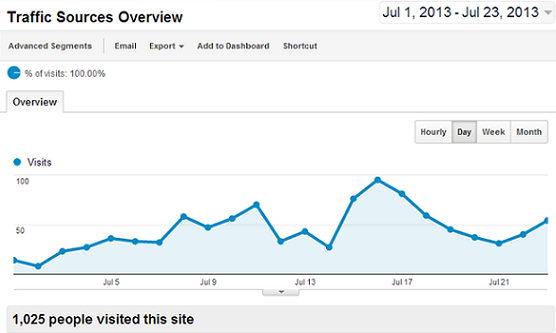Earlier on, I explained the importance of keyword research and how to conduct it. I also explained the concept of on-page SEO and how to implement it on your blog posts.
Here, I’ll be discussing the main task that off-page SEO involves — link building.
In case you don’t know what the terms “keyword research”, “on-page SEO”, and “off-page SEO” mean, check out the following posts to get full understanding of them:
- Key Online Business Terms Every Newbie Must Know
- Keyword Research: The Ultimate Guide to Finding Profitable Keywords
- Search Engine Optimization (SEO): A beginner’s Guide
Now, let’s discuss the main topic, which is link building.
After researching for lucrative keywords and optimizing your blog posts for them, you’ll most likely have your blog ranking for your target keywords — provided you avoided high competition keywords.
But there are times when your efforts still won’t produce the desired results. I mean, sometimes, your blog won’t rank as you expected after targeting and optimizing your post for a particular low competition keyword phrase.
And there are times when your blog ranks well for your target keyword, but soon starts to go down gradually until you can no longer find it on the first results page.
Both instances could be frustrating. Very frustrating.
The cause of the problem is the same in both cases — your blog doesn’t have enough “authority” to rank well for the keyword phrase. So, it cannot compete with the big sites that are sitting on top of the search result rankings for that keyword phrase. And if it finds its way among them for some time, they quickly send it back to down below.
Now, what is this authority thing?
You see, aside ranking sites based on their relevance to the keyword phrases used in search queries, Google also uses a concept known as “domain authority” to rank sites.
The domain authority of a blog can simply be defined as the measure of the blog’s quality and credibility. How does Google estimate this? Simply by looking at the number of quality links that are pointing back to the blog from other blogs or websites. You get it now?
So, even if you’ve optimized your post well for a low competition keyword, some websites and blogs may still outrank yours if they have higher domain authority than your blog. But this rarely happens if you target long-tail keywords with very low competition.
Now, why does Google rank websites based on backlinks? The answer is, Google considers a backlink pointing to your blog from another blog or website as a vote of confidence and trust from that blog. And the higher the domain authority of the blog or website linking to you, the higher the quality of the link itself.
So, the higher the number (and quality) of backlinks pointing to your blog from other blogs and websites, the higher your blog’s domain authority becomes. And the brighter your chances of ranking for medium to high competition keywords as well as keeping your position in the rankings for a long time.
What is ethical link building?
Ethical (or “white-hat”) link building simply refers to creating backlinks in ways that are organic (“natural”) and that involve no manipulations or shortcuts. Search engines hate unnatural links and they penalize websites and blogs found to be associated with them.
So, when you create backlinks for your blog, ensure that you do not violate any of the link building guidelines laid down by the major search engines.
Here are 4 ways to create backlinks that won’t get your blog penalized in the long run:
1. Quality content
If you’re too lazy (or too stingy) to create and publish valuable and unique content on your blog, then you have no business with blogging or online business in general. Quality content is one of the major factors that matter in online business — in case you didn’t know before now.
By publishing quality content on your blog that readers find very helpful and informative, you’ll attract lots of backlinks from other websites and blogs. I mean, other people who found your content helpful would link to it from their own blogs. This is the easiest (and most ethical) way to generate quality backlinks.
2. Guest posting
Aside helping you attract traffic from other blogs, guest posting is a powerful link building strategy. Virtually all blogs would give you the chance to add a link or two to your blog within your guest post.
So, if you’re looking to create high quality backlinks, publish guest posts on authority blogs within your niche.
3. Article marketing
This involves publishing articles on article directories such as Ezine articles. These directories allow you to place one or two links within the author bio section of your article, thereby sending links to your blog.
Many bloggers would tell you that article marketing is dead and no longer works for link building. But I beg to disagree. Let me share this with you:
Sometimes in February 2013, a client of mine who just set up a new blog wanted the blog to rank on Google’s front page for his main target keyword. Because the domain name included the target keyword, I was confident that the blog would rank well once we published some articles.
But that wasn’t to be. The blog didn’t even get to the third page of Google’s results for the target keyword. For 2-3 weeks after we published a series of long, high quality, well-optimized articles, the blog ranked between positions 31 and 33.
I had to do something fast. Then I thought of article marketing. I explained the whole concept to the client, and we both agreed that I’ll write 15 articles and have them published them on article directories (an article to one directory). I did this over a period of one month.
After I published 7 out of the 15 articles, the blog jumped up to the 11th position. After I published 9 articles, the blog ranked 10th. After the last article went live, the blog moved up to the 8th position. Mission accomplished — thanks to article marketing.
So, who says article marketing is dead? It’s still alive. And it still works — magically!
During some algorithm updates that happened in the past, most of the popular article directories lost their rankings in Google because webmasters were using them to create spammy links. Yes, this happened, and it’s reason why most webmasters think that article directories have lost all their relevance. But in reality, they only lost their rankings, not their authority, and not their Page Rank values.
4. Blog commenting
You can also create backlinks by leaving helpful comments on other people’s blog posts. Because the comment form allows you to leave your blog address, each comment you leave automatically includes a backlink to your blog.
But don’t abuse this technique by leaving silly comments like “nice post” or “thanks”. Doing this clearly shows that you’re more interested in creating a backlink than anything else. It annoys most bloggers, and gets your comment trashed.
So, when you leave comments on other blogs, leave detailed comments that show you really read the post.
Conclusion
While there are many other link-building techniques, I’d advise you to stick with only these four. Reciprocal backlinking (exchanging backlinks) is frowned upon by search engines. Automated backlinking (generating links with software) creates tons of spammy backlinks that may get you quick results, but will eventually leave you badly burnt in the long term.
Once again, stick with only the four link building tactics I shared here, and you’ll get good, long-term results.
Over to you
Do you think I missed some points? Or do you disagree with something? Or do you have a question? Or a comment? Share your thoughts with me. I’ll reply.



You must be logged in to post a comment.